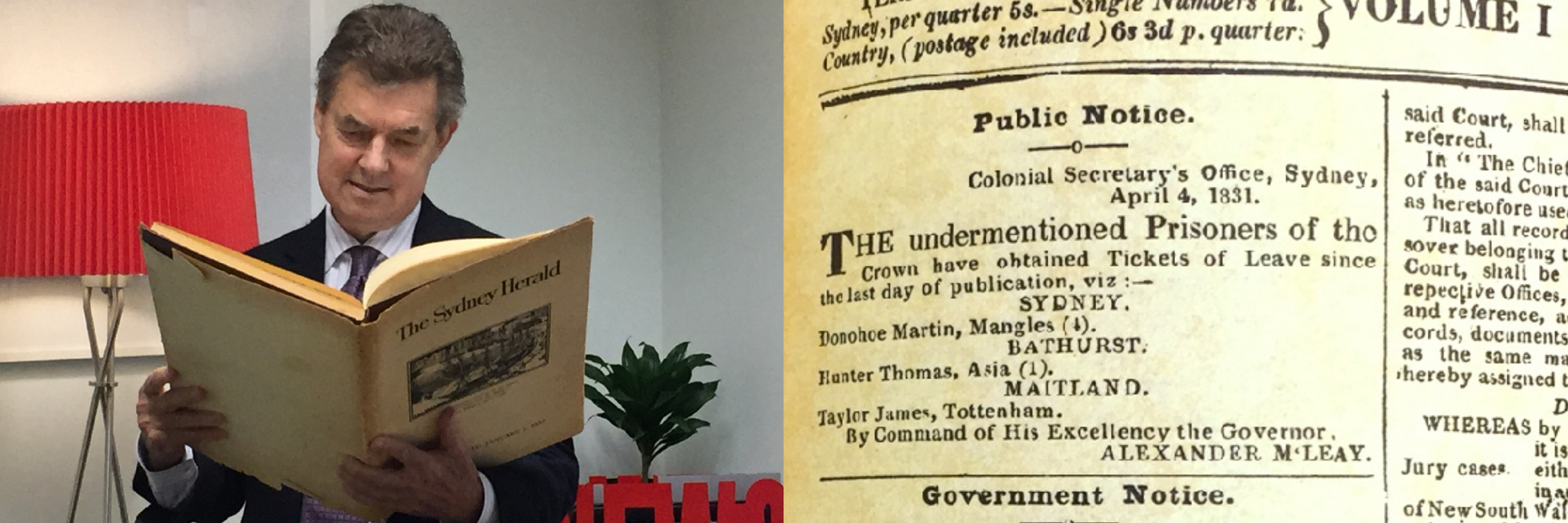In Australia there’s a conversation, an undercurrent, about replacing PM Turnbull. Som e say “Why, who else is there?”; others say “Why not replace one lack lustre performer with another.” If companies can sack CEO’s without undue suffering, why can’t governments. The point is, voter, or consumer loyalty to old-ways is vanishing.
e say “Why, who else is there?”; others say “Why not replace one lack lustre performer with another.” If companies can sack CEO’s without undue suffering, why can’t governments. The point is, voter, or consumer loyalty to old-ways is vanishing.
I treasure this book, thirty-eight of the first 1831 editions of the Sydney Herald (now Sydney Morning Herald); the lead story about the Ticket of Leave (partial freedom) given to three convicts in the fledgling settlement.
But I haven’t bought a paper, the hard copy, for about three years. For the moment, it’s on my iPhone and laptop, and the way so many of us gather our news and entertainment changes all the time.
The New York Times now says the life cycle of a modern news organisation is about 18 months. That’s the length of time between totally different business plans.
In that time, says the paper, consumer’s preferences change, the journalism changes, the advertising changes, the financial model changes, and so the marketing changes. And the change to each is happening imperceptibly every day, and in a complex interrelated dance with the others.
This type of change is happening to all of us, at differing paces. A potential leadership nightmare. Successes and failures are most visible in politics. It requires continual, disruptive, difficult cultural change.
The blurring of boundaries
It’s the same in my field – crisis PR and reputation management. Even the term, PR, along with marketing and advertising, has long since lost its original meaning. These three are also in another complex interrelated dance with consumer demands.
And the separation between those two huge sectors – MarComms and Publishing – is blurring. For instance, journalism is often PR and vice versa. Now, via social and digital media, they are all one, a complex organism of many moving parts. With everyone chasing the often-over-whelmed consumer.
Leadership: consumers driving the future
It used to be the consumer asked:
Give me the information and entertainment I want, when I want it!
In publishing they’re now getting that. So now we are seeing consumer’s demanding:
Make my life simpler!!
Make me trust you!
Make me trust you!
That’s an active not a passive.
Being a good leader isn’t always enough; you have to be seen to be good. As trust is fading faster, and cynicism rises, tolerance is falling. If you as a leader haven’t got a positive profile on Google, and you are even an inadvertent victim of bad publicity, you’ll be punished all the more.
So, it’s logical the future trend is with straight talking, values-driven, reliable commentators and leaders prepared to take a profile. And there’s a quick outing of people who can’t or won’t explain themselves.
In this social media world, it’s a bold call for a board to employ an introvert for a CEO?
In the business community we are seeing this trend in many ways, the increase in class actions being just one, another being the increasing trend to turn-over under-performing CEOs.
But we see it most visibly in politics, which is one good reason to watch and learn. Trustworthiness and straight-talking now often beats experience, and good policy.





